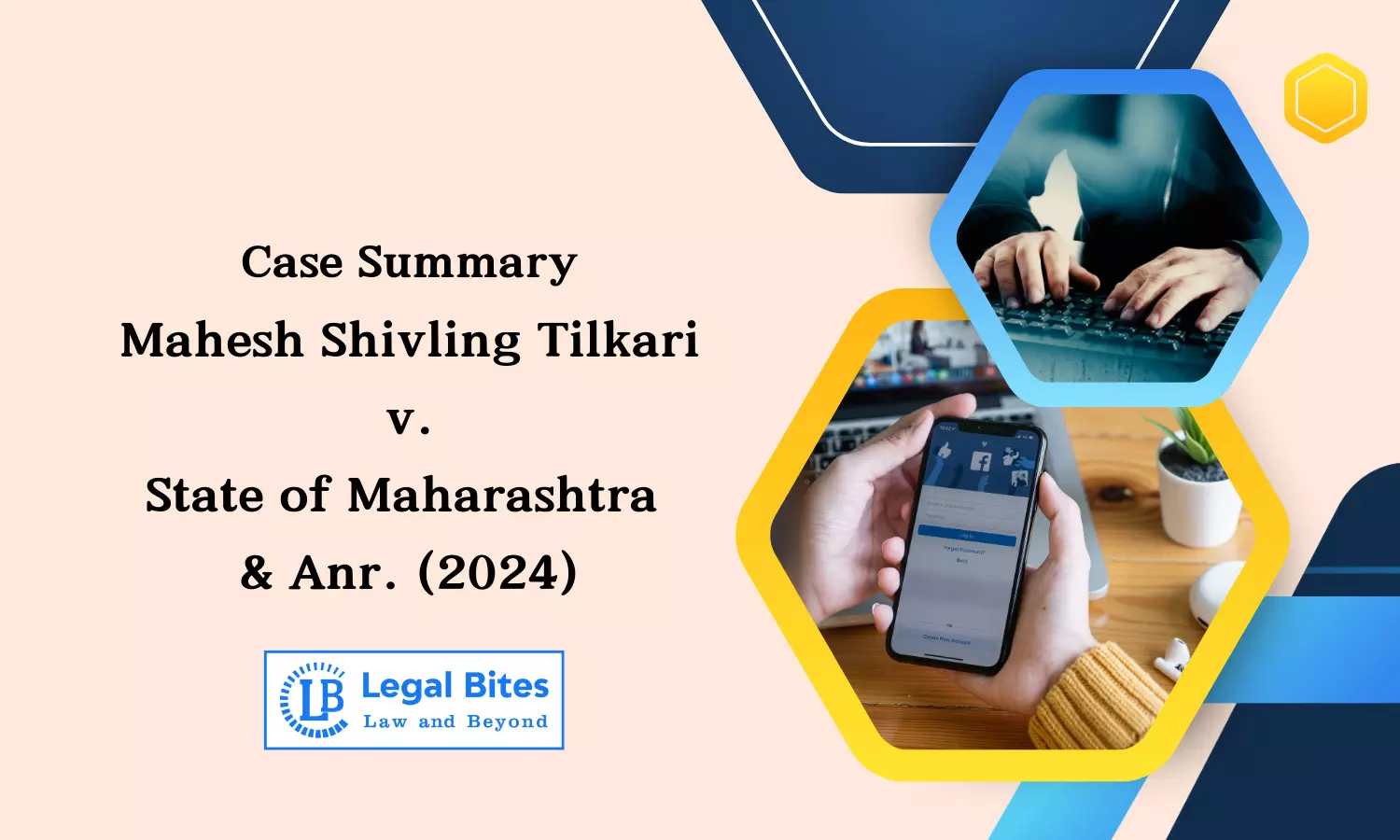Case Summary: Mahesh Shivling Tilkari v. State of Maharashtra & Anr. (2024) | Facebook Screenshots Insufficient as Evidence of Fake Account Creation
This case highlights the critical need for evidence-based prosecution in cybercrime and defamation cases.

This case illustrates the High Court's obligation to act when prosecutorial overreach threatens to subject individuals to unnecessary harassment due to insufficient evidence. It highlights the court’s role in safeguarding against misuse of legal proceedings.Court: High Court of Judicature at Bombay, Aurangabad BenchCase Title: Mahesh Shivling Tilkari v. State of Maharashtra & Anr.Citation: Criminal Application No. 2850 of 2019Judges: Smt. Vibha Kankanwadi & S.G. Chapalgaonkar,...
This case illustrates the High Court's obligation to act when prosecutorial overreach threatens to subject individuals to unnecessary harassment due to insufficient evidence. It highlights the court’s role in safeguarding against misuse of legal proceedings.
Court: High Court of Judicature at Bombay, Aurangabad Bench
Case Title: Mahesh Shivling Tilkari v. State of Maharashtra & Anr.
Citation: Criminal Application No. 2850 of 2019
Judges: Smt. Vibha Kankanwadi & S.G. Chapalgaonkar, JJ.
Date of Judgment: 22nd October 2024
Background of the Case
The case revolves around a dispute between the applicant, Mahesh Shivling Tilkari, a medical practitioner, and his brother-in-law, Sachin Shivchandra Karaknale (Respondent No. 2). Karaknale alleged that Tilkari had created fake Facebook accounts in the names of two individuals, Minal Basavraj Swami and Chandra Surnal, to defame his family, particularly targeting Tilkari's wife due to ongoing marital discord.
A First Information Report (FIR) was lodged, accusing Tilkari of identity theft and defamatory content creation. He was charged under Sections 66(C) and 67 of the Information Technology Act, 2000.
Legal Provisions Involved
Section 66(C) of the IT Act: This section deals with punishment for identity theft, where any fraudulent or dishonest use of another person’s electronic signature, password, or unique identification features can lead to imprisonment of up to three years and a fine.
Section 67 of the IT Act: This section criminalizes the publishing or transmission of obscene material in electronic form, intending to punish those who share material that could corrupt individuals likely to view it.
Court’s Observations
The court noted significant gaps in the investigation, highlighting that the investigation was handled poorly without adhering to established cybercrime detection protocols.
It was emphasized that when allegations include the creation of fake social media accounts, the investigation must involve cyber forensics to trace the origin of these accounts, such as identifying the IP address or devices associated with the creation of the accounts.
The court questioned the validity of the evidence presented, pointing out that screenshots of social media profiles alone cannot conclusively prove that Tilkari created the fake accounts.
Analysis of Evidence
Lack of IP Evidence: The court underlined that evidence should have included technical data, like the IP address, to demonstrate that Tilkari operated the fake accounts. Without such data, attributing these accounts to Tilkari remains speculative.
Failure to Seek Expert Assistance: The investigating officer did not employ a cyber expert to analyze the digital evidence, which could have provided crucial insights into the device or location from which the accounts were accessed.
Marital Discord and Alleged Defamation: While it was argued that the posts were defamatory, the content did not meet the legal threshold of obscenity as required under Section 67 of the IT Act.
Application of Section 66(C) of the IT Act
Identity Theft Requirements: For a charge under Section 66(C), the prosecution must show that the accused used someone else’s electronic signature, password, or unique identification without authorization. The court found no evidence to suggest that Tilkari used any personal identification credentials belonging to another person.
Screen-Shot-Based Evidence: Given the reliance solely on Facebook screenshots, the court ruled that there was insufficient evidence of identity theft as prescribed under Section 66(C).
Application of Section 67 of the IT Act
Obscenity and Defamatory Posts: The court analyzed whether the content could be classified as “obscene” under Section 67. It concluded that the posts, while potentially defamatory, did not meet the legal definition of obscenity as required by this section.
Context of Defamation: The court acknowledged that the posts might have been intended to harm the informant's reputation. However, without a direct link to Tilkari, these allegations did not satisfy the requirements of criminal liability under Section 67.
Decision of Court
The court exercised its powers under Section 482 of the Code of Criminal Procedure (CrPC), which enables the High Court to prevent the abuse of the judicial process. The court emphasized that compelling Tilkari to face trial in the absence of compelling evidence would be an unjust application of judicial resources.
The court quashed the proceedings in Regular Criminal Case No. 2/2019, setting aside all charges under Sections 66(C) and 67 of the IT Act against the applicant.
Significance of the Judgment
Implications for Cybercrime Investigations: This judgment highlights the need for law enforcement to adopt a thorough and expert-led approach to cybercrime investigations. Reliance solely on screenshots or superficial evidence without technical validation is insufficient, particularly when dealing with cyber offences that require specialized forensic analysis.
Defamation vs. Obscenity: The court’s analysis differentiates defamation from obscenity, underscoring the importance of context in applying Section 67 of the IT Act. Mere defamatory intent does not necessarily amount to obscenity under the law.
Role of the High Court in Preventing Judicial Misuse: This case demonstrates the High Court’s responsibility to intervene in cases where prosecutorial overreach might lead to the unwarranted harassment of individuals based on insufficient evidence.
Conclusion
The High Court’s decision in this case underscores the importance of evidence-based prosecutions in cybercrime and defamation cases. The judgment serves as a reminder for law enforcement to approach cyber allegations with the requisite technical expertise to establish credible links between accused individuals and alleged digital misconduct. The court’s application of Section 482 CrPC reflects a commitment to prevent unnecessary trials when evidence does not sufficiently justify criminal proceedings, safeguarding individuals from potential judicial overreach.
Click Here to Read the Official Judgment

Apurva Neel
I am a Research Associate and Editor at Legal Bites with an LL.M. specialization in Corporate and Commercial Laws from Amity University, Mumbai. I have put my best efforts into presenting socio-legal aspects of society through various seminars, conferences etc. I keep refining content as I am an ardent writer, and palpably law has got multi-dimensional aspect, so I passionately try to explore ahead.
